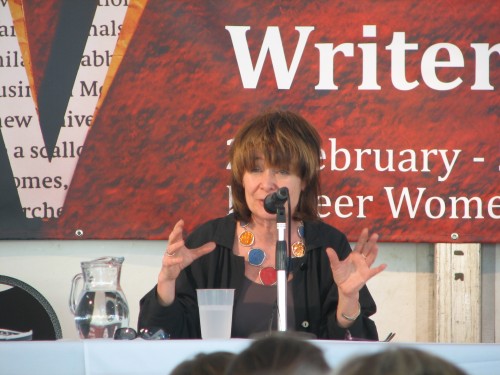Sarah Dunant at the Adelaide Writers’ Week 2010
One of the great things about attending a writers week like that recently held in Adelaide during this year’s Festival of Arts is that you get to meet and hear from a wide range of writers from around Australia and from overseas.
At this festival I attended on three of the six days. I heard from a number of writers I had never heard of before, let alone read any of their works. This is exciting, for it is an excellent way of finding new writers to read and new books to pursue. The downside is that one can simply get overwhelmed by the sheer number of excellent writers out there, many of whom have published three, four, ten or even dozens of books, all of them worthy of attention.
Where to start. [Sigh]
One of the sessions I attended was a meet-the-author type presentation with UK writer Sarah Dunant (pictured above). She gave a lively, entertaining and fully engaging talk. She lives part of the year in London and the rest in a Florence apartment.
[Bigger Sigh – I can dream can’t I?]
She explained how she developed from a crime writer into one who loves writing historical fiction. Her last three books are set in Italy in the 1500s and she went to great lengths to explain how she goes about her research, some of the fascinating facts that research has discovered about that era in recent decades and the impact of an understanding of religion on her writing.
“To understand the past you must understand religion,” she said. “Five hundred years ago it was the only game in town.” Sarah Dunant at the 2010 Adelaide Writers’ Week.
Her recent books include The birth of Venus (2003), In the company of the courtesan (2006) and Sacred hearts (2009).
I must put her books near the top of my ‘must read’ list.
Good reading.
Good writing.

How she does historical research? I think she probably just steps outside her door and finds it all around her. Can’t do that in Australia.
Indeed she does Ken. Florence – and many other places in Italy are literally reeking with history that she draws on for her books.
However – a big however too – she claimed that much of her research has been gleaned from researchers delving into previously locked up archives in the churches there, including the Vatican.
According to her they have discovered some amazingly rich veins of information about life in Italy 500 years ago. Some shocking – most fascinating. She said her books could not have been written as recent as 20 years ago – the “facts” she includes about life in convents and society in general have been hidden for centuries.
One example: they have discovered large numbers of manuscripts of plays and poetry written and performed by nuns inside the convents and never performed in public. It seems that the creative arts were extremely alive – and lively – in such places.
In part I agree with you regarding Australia with its very short history. If we look beyond the European (and increasingly Asian) elements of our history, we see one of the oldest histories known on this planet – Aboriginal culture. There is a very rich vein that few have mined successfully.
But there is an inherent danger – a mine field for the unwary (and to shift the metaphor!) Getting permission to use this history in your writing is almost impossible unless one can prove your Aboriginality. Just ask Wendy Noble who had enormous troubles with her as yet unpublished novel done for her MA.
[…] international speakers at the recent Adelaide Writers Week was crime and historical fiction writer Sarah Dunant. I managed to catch her talks several times. I didn’t take too many notes but I did record […]